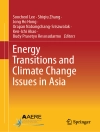Soocheol Lee is a professor at the Faculty of Economics at Meijo University in Japan. He earned his Ph.D. from the Graduate School of Kyoto University and has been researching desirable energy and environmental policy design for a sustainable low-carbon economy in Asia for over 30 years. Professor Lee has published numerous articles and books on this field. He has led many projects supported by Grants-in-Aid for Scientific Research from the Japanese government. Prior to coming to Japan in 1994, he had worked for the Federation of Korean Industry as a team leader of the Economic Research Department. He had served as a vice president of Asian Association of Environment and Resource Economics(AAERE) and as a director of Environmental Economics and Policy Studies(SEEPS). He is currently an adviser of Korea Environmental Economics Association.
Shiqiu Zhang is a professor of Environmental Economics at Peking University. She has been teaching on environmentaleconomics and environmental management and has been conducting various research projects covering environmental economics, environmental policy and management, and global environmental treaties. She is currently a BOD member of Society for Benefit-Cost Analysis, senior expert member of UNEP Technology and Economic Assessment Panel for implementing Montreal Protocol, and co-chair of the Task Force for Replenishment of the Multilateral Fund for Implementing the Montreal Protocol (UNEP). She served as a member of Scientific Advisory Panel for UNEP Climate and Clean Air Coalition to Reduce Short Lived Climate Pollutants (CCAC) (2013–2019) and president of Asian Association on Environment and Resource Economics (AAERE) (2017–2019).
Jong Ho Hong is a professor of Economics and former dean of the Graduate School of Environmental Studies at Seoul National University. His involvement within the university extends to serving as the former director of the Environmental Planning Institute and the Institute for Sustainable Development. After receiving his Ph.D. from Cornell University, he held positions at Korea Development Institute and Hanyang University. He also has broad experiences working as a consultant for international organizations, such as the World Bank and Asian Development Bank. He has previously served as the president of the Asian Association of Environmental and Resource Economics, Korea Environmental Economics Association, and Korean Association of Public Finance. He is an award-winning author with his recent book titled “Climate Crisis the Great Shift of Wealth.”
Orapan Nabangchang formerly served as the deputy director of the Economy and Environment Programme for Southeast Asia (EEPSEA), director of the Economy and Environment Institute of the Lower Mekong Sub-Region (EEI-LMS), and vice president of Asian Association of Environment and Resource Economics(AAERE). She has conducted researches for agencies interested in theory andapplication of environmental economics such as the Court of Justices, Department of National Park Wildlife and Plants, Department of Marine and Coastal Resources, United Nations Development Programme, United Nations Environment Programme, World Wildlife Fund, the International Union for Conservation of Nature, and the ASEAN Center of Biodiversity. She currently serves as a member of the National Committee on Policy and Planning of Coastal and Marine Resources.
Ken-Ichi Akao is a professor in the Faculty of Social Sciences at Waseda University in Tokyo, Japan. He specializes in environmental and resource economics, with a primary focus on economic dynamics. His research interests include sustainability, environmental policies, natural resource management, and the renowned concept of the tragedy of the commons. Dr. Akao has published numerous papers on topics such as dynamic games, optimal growth with nonconvexity, optimal forest management, and environmental policy measures in intertemporal economies. Additionally, he serves as a co-editor for the Journal of Environmental Economics and Policy Studies, published by Springer. Previously, he held the position of president at the Society of Environmental Economics and Policy Studies. He earned his Ph.D. in agriculture, specifically in the field of forest management, from Kyoto University.
Budy P. Resosudarmo is a professor at the Arndt-Corden Department of Economics, deputy head at the Poverty and Inequality Research Centre and researcher at the ANU Indonesia Project, Crawford School of Public Policy, at the Australian National University (ANU). His research areas are development economics, environmental and resource economics as well as public policy. In conducting his research, he implements, among others, impact evaluation, and spatial and inter-regional modeling techniques. Since mid-1990s, he has been publishing series of articles on the impacts ofenergy, air pollution, and climate change policies on local economy as well as human welfare and health conditions. Resosudarmo received his B.Sc. degree in electrical engineering from Bandung Institute of Technology, M.Sc. degree in operations research from University of Delaware, and Ph.D. degree in development economics from Cornell University.
1 Ebooks door Shiqiu Zhang
Soocheol Lee & Shiqiu Zhang: Energy Transitions and Climate Change Issues in Asia
The rapid pace of economic development and urbanization in Asia have led to several major problems such as greenhouse gas emissions, mass consumption, and depletion of natural resource …
PDF
Engels
€171.19

